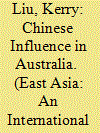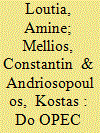|
|
|
Sort Order |
|
|
|
Items / Page
|
|
|
|
|
|
|
| Srl | Item |
| 1 |
ID:
178165


|
|
|
|
|
| Summary/Abstract |
Australia—China relations, and especially Chinese influence in Australia, have been the subject of heated debate in Australia since 2016. The central issue is, how to balance concerns over Chinese influence in Australia with the economic benefits of Chinese trade and investment? This study—arguably the first of its kind—answers this question using rigorous empirical modelling. First, it uses Google Trends search results to measure Chinese influence in Australia. Second, it connects Chinese influence, as reflected in Google Trends search results, to financial markets, including stock markets, government bond markets and foreign exchange markets. Weekly data for January 2016–December 2019 are entered into an exponential generalised autoregressive conditional heteroskedastic model. The study finds that the effects of concerns over Chinese influence relate mainly to increased volatility of stock market indices and government bond yields, and downward pressure on the share prices of individual firms that are heavily exposed to Chinese markets. However, the overall effects appear to be minor or insignificant. The implications of these results are that China’s economic coercion (if any) may not be effective, and Australia’s responses to Chinese influence and interference (if any) may generate insignificant costs. Finally, this study makes original and significant academic contributions to academia by providing a novel framework for exploring international relations.
|
|
|
|
|
|
|
|
|
|
|
|
|
|
|
|
| 2 |
ID:
150810


|
|
|
|
|
| Summary/Abstract |
This paper investigates the effect of OPEC production decisions (increase, cut, maintain) on both WTI and Brent crude oil prices between Q1 1991 and Q1 2015 by employing the event study methodology and by using two indices as benchmarks (BCI and S&P GSCI). We employ an EGARCH model to take into account the high volatility of oil prices and some stylized facts characterizing this volatility. We find that the impact of OPEC’s announcements on oil prices (i)evolves over time and among decisions, (ii) is more significant for production cut and maintain, (iii) is different for WTI and Brent prices, and (iv) is sensitive to the benchmark index. Moreover, OPEC’s decisions depend on the exploration and extraction cost of more expensive/unconventional oil resources.
|
|
|
|
|
|
|
|
|
|
|
|
|
|
|
|
| 3 |
ID:
171044


|
|
|
|
|
| Summary/Abstract |
Over the last three decades, we have widely witnessed the peculiar relationship between tourism and incidents of political instability. Responding to the urgent call for additional empirical inquiries, we conducted an econometric study, using the VAR-EGARCH-DCC model, on the regional tourism interdependency (volatility) between four Eastern Mediterranean countries, namely Greece, Turkey, Cyprus and Israel. Monthly arrival data from 1987 to 2012, along with a series of political instability variables collected from machine-coded databases, were utilized to model effects and to add empirical substance to contemporary and emerging theories. Our findings are relevant to industry stakeholders in that they explore tourism demand and volatilities. The findings indicate a positive effect on tourism demand in the presence of verbal or material cooperation between a destination country and others. In contrast, when investigating verbal conflict between a destination country and others, our findings reveal a negative impact on tourist arrivals and an increase in volatility in the destination country. Finally, in our investigation of incidents of material conflict, we saw a strong negative impact on tourist arrivals in all four destinations, accompanied by a significant increase in volatility.
|
|
|
|
|
|
|
|
|
|
|
|
|
|
|
|
|
|
|
|
|